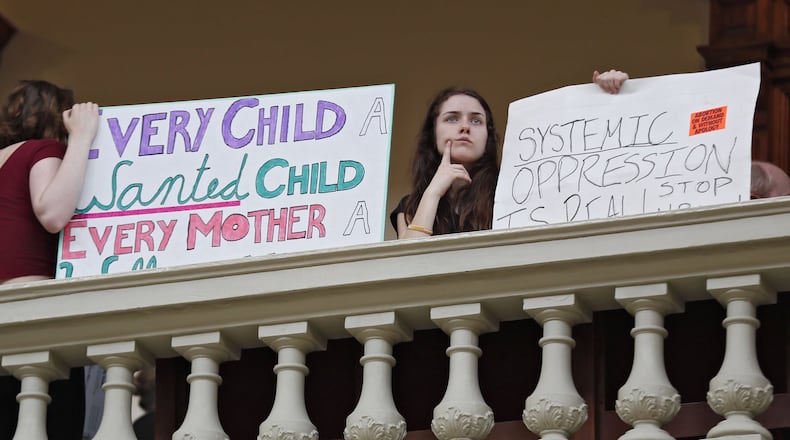A federal appeals court said Monday that it will hold off deciding the fate of Georgia’s 2019 anti-abortion law until the U.S. Supreme Court issues a ruling on a similar lawsuit out of Mississippi.
A panel of three judges on the 11th U.S. Circuit Court of Appeals said it will wait until the Supreme Court rules in a lawsuit challenging the constitutionality of Mississippi’s ban on most abortions after 15 weeks of pregnancy. That hearing is scheduled for Dec. 1, with a ruling expected sometime next year.
Georgia’s law is more restrictive than the one being heard by the Supreme Court in December. Attorneys on both sides of the case agreed that it made sense to wait to see how the Mississippi case plays out.
The American Civil Liberties Union of Georgia, on behalf of the abortion rights group SisterSong Women of Color Reproductive Justice and several abortion providers, sued Gov. Brian Kemp and other state officials in 2019. A federal district judge struck down the law in 2020, blocking it from taking effect, and the state filed its appeal shortly after the ruling.
“The court’s stay means that Georgia’s abortion ban remains blocked until further notice from the court,” said Sean J. Young, an attorney with the ACLU of Georgia. “Meanwhile, women will continue to be able to make their own health care decisions as U.S. Supreme Court precedent requires.”
A spokesman for Georgia Attorney General Chris Carr said he could not comment on pending litigation.
The three-judge panel heard arguments last week on the constitutionality of Georgia’s abortion law, which bans the procedure after a doctor can detect fetal cardiac activity — typically about six weeks into a pregnancy and before many women know they are pregnant.
If the Supreme Court rules in favor of allowing the Mississippi law to take effect, attorneys in Georgia may need to file additional documents to support their arguments.
Georgia’s law also includes what many supporters call “personhood” language, which would extend legal rights to fertilized eggs. Those provisions would allow parents to claim a fetus, once fetal cardiac activity is detected, on their state taxes as a dependent, collect child support from the father and require state officials to count an unborn child toward Georgia’s population.
Anti-abortion activists in Georgia and across the country have sought for years to overturn Roe v. Wade, the 1973 Supreme Court ruling that established a constitutional, nationwide right to abortion.
“The 11th Circuit’s decision to stay Georgia’s (abortion law) only confirms that, with modern medical science showing the complex development of human life in the womb, Roe v. Wade is no longer a matter of settled law,” said Joshua Edmonds, executive director of anti-abortion group Georgia Life Alliance. “We look forward to the 11th Circuit ultimately upholding Georgia’s heartbeat bill so we can begin protecting innocent children and providing the much-needed tax deduction and child support benefits it provides to pregnant women.”
Over the past decade, the 11th Circuit — which has jurisdiction over federal appeals from Georgia, Alabama and Florida — has become decidedly conservative, because then-President Donald Trump, who called for the overturning of Roe v. Wade, appointed six of its 12 judges to the bench.
In last week’s abortion case, all the judges were appointed by Republican presidents. Two of them were among Trump’s finalists in filling U.S. Supreme Court vacancies: Chief Judge Bill Pryor, appointed by President George W. Bush, and Judge Barbara Lagoa, a Trump appointee.
The third judge on the panel, Harvey Schlesinger, a senior U.S. district judge from Jacksonville, Florida, was appointed by President George H.W. Bush.
About the Author
Keep Reading
The Latest
Featured




